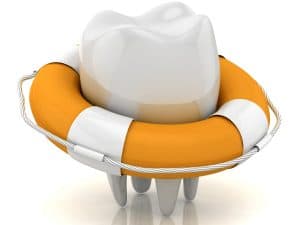A Filling Can Save Your Tooth

Dental caries is the medical term for tooth decay or cavities. Chances are that you have had, currently have, or will have dental caries at some point in your life. According to the National Institute of Dental and Craniofacial Research, 92% of American adults have had dental caries in their primary teeth. Getting a cavity is not the end of the world; it is not the end of your tooth either. Well, it is not necessarily the end of your tooth. If a cavity is left untreated, the decay can progress so deeply that extraction becomes the only option to prevent health complications. A filling can treat a cavity in the early stages.
The Progression of Tooth Decay
In the earliest stage of tooth decay, the decay can actually be reversed. Fluoridated toothpaste and water can help prevent the decay from penetrating the enamel and causing a cavity. Regular check-ups with your dentist will allow for your dentist to identify tooth decay in this earliest of stages. If the decay does penetrate the enamel, the erosion process will begin. Once your tooth’s enamel begins to erode, their is no way to reverse it. If left untreated, the decay will reach the dentin, the next layer under the enamel. It is likely that pain may not be felt while a cavity only affects the enamel, but pain will be felt once it hits the dentin. A filling could stop decay from progressing if decay has reached either the enamel or the dentin. But once the decay gets past the dentin into the inner pulp, a filling will no longer be enough treatment. Once the decay reaches the deep inner layers of the tooth, a root canal treatment will be required to remove the infection. If still left untreated, an abscess infection can form at the tip of the root near the bone. Extraction may be necessary at this point.
A Filling Can Prevent Deep Decay
By removing the decay and restoring the tooth with a filling when the cavity is still in an early stage, your tooth is protected against potential extraction.
Do You Have a Toothache That May Need a Filling?
A filling can save your tooth from more invasive treatment. To learn more, schedule an appointment by calling Cosmetic & Implant Dentistry of Kansas City, MO, today at 816-427-4018.
